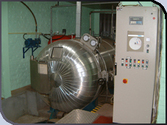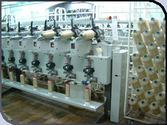Soieries Elite nv
Über uns
The company was founded in 1932 and we are speciallised in uptwisting, twisting, assembling, heatsetting and winding of artificial and synthetic filament yarns.
We work up Viscose, Acetate, Polyamid, Polyester, Polypropyleen, Aramid but also special yarns as metalloplastic (Lurex), metal, antistatic carbonyarn, watersolubel and thermo-adhesif threads.
All these yarns can be twisted on order as per your specifications. We also sell specially prepaired yarns for weaving or knitting and for laces- or trimmingsproduction and have our own line of gimped metalloplastic yarns: ELIREX
Unsere Produktgruppen
- Fibres and Yarns
Unsere Anwendungsbereiche / Lösungen
Keywords
- Geotextilien
- Bekleidungstextilien
- Textilien für die Datentechnik
- Fasern
- Antistatische Textilien
Unsere Produkte

Twisting
Twisting together several yarns to obtain a new yarn with specific properties.
There are many ways to adapt yarns to your specific demands.
Embroidery yarns and sewing threads have opposite twist directions on single and folded ends to obtain brilliant and high performing yarns.
Thin or delicate yarns can be supported with a reinforcement yarn so that they can be processed further on without problems. We have more than 40 years experience with metalloplastic yarns and produce many types exclusively for The LUREX Comp.
We assemble filament yarns with F901 antistatic Carbon yarns in collaboration with Shakespeare Monofilaments Ltd to be used in technical fabrics such as filtration, clean rooms, personal protection, shielding, … .
Yarns with different physical properties can be assembled to obtain special effects after weaving or finishing.

Heatsetting
Fixation of the twist and/or shrinkage of the yarn.
This operation has mostly to be done to stabilize the twist and to avoid curling of the yarn.
Depending upon type of yarn, heatsetting is done between 60°C and 135° C.
Sometimes heatsetting is done to obtain special effects when yarns with different grades of shrinkage are used.
We use up to date equipment, fully computerized, to guarantee reproducebility of the process.

Uptwisting
Increasing the twist of a single end yarn to make it more resistant.
Typical operation to make warpyarn more resistant against breakage of filaments. If filaments are broken, they will move less easy and avoid so thicknesses in the yarn that would cause yarn breakage.
A moderate twist will make the yarn rounder and smoother so that even weftyarns can be treated successfully.
Before yarns can be dyed it's often necessary to uptwist the yarn and heatset to reduced residual shrinkage.
We have doubletwist spindles as well as traditional uptwist spindles so that every yarn can be treated under optimal conditions.

Folding
Assembling two or more ends with low twist to obtain a thicker yarn.
By assembling yarns we can obtain exactly the thickness you want to have.
This can be usefull when yarns in desired thickness are not available from the producer and you don't have the required space or equipment to use more ends at same moment in your production.
Even if you have the space and equipment, it can happen that yarns do not remain together and thus giving faults in the fabric. Yarns assembled previously with equal tension and light twist may solve many problems.

Winding
Rewinding onto conical or cylindrical tubes of equal length.
Many yarns are used directly from the twisting tube, because of the price.
Removing faulty spots, having equal tension and length and a precision winding can sometimes add so much quality to the fabric that it's worth the supplementary cost.
We can work all delicate yarns on our SSM Preciflex machines equipped with electronic length measurement.



